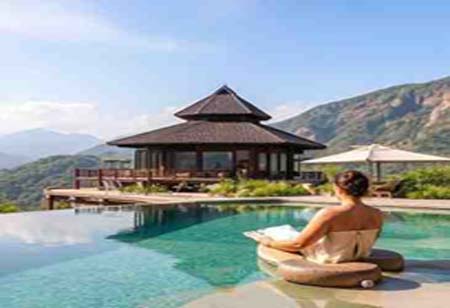Thank you for Subscribing to Hospitality Business Review Weekly Brief
- Home
- Topics
- Automatic Coffee Machines
- Catering and Dining Services
- Hospitality Advisory Services
- Hospitality Construction Services
- Hospitality Consulting Services
- Hospitality Marketing
- Hospitality Procurement
- Hospitality Staffing Services
- Insurance Services
- Travel and Tourism Management
- Vacation Rental Property Management
- Vendors
- News
- Contributors
- Conferences
- Newsletter
- Subscribe
- About Us
- CXO Awards
-
The Rise of Experiential Travel and its Impact on Hospitality
Experiential travel in Asia-Pacific is transforming hospitality, driven by affluence, social media, millennials, and post-pandemic changes. Hotels are becoming lifestyle destinations, eco-friendly practices, and wellness-focused hotels.

By
Hospitality Business Review | Tuesday, October 21, 2025
Stay ahead of the industry with exclusive feature stories on the top companies, expert insights and the latest news delivered straight to your inbox. Subscribe today.
FREMONT, CA: Experiential travel, a concept focusing on immersive experiences over traditional sightseeing, is rapidly gaining traction in the Asia-Pacific (APAC). This shift in traveler preferences significantly impacts the hospitality industry, prompting businesses to adapt and innovate to cater to the evolving needs of discerning travelers.
Several factors are driving the rise of experiential travel in the APAC region. Increasing affluence, particularly in countries such as China, India, and South Korea, has enabled a broader segment to afford luxury travel experiences. Social media platforms like Instagram and TikTok have fueled the demand for unique, shareable travel moments. Additionally, millennial and Gen Z travelers prioritize experiences over material goods and seek authentic and immersive trips. The post-pandemic landscape has also contributed to this trend, with many people viewing travel as an opportunity to reconnect with the world and pursue meaningful experiences.
This shift toward experiential travel is significantly reshaping the APAC hospitality industry. Hotels are evolving from traditional accommodations to lifestyle destinations, offering curated experiences such as cooking classes, wellness retreats, and cultural workshops. Boutique hotels, which emphasize personalized service and community, are gaining popularity. There is also a growing emphasis on local partnerships, with hotels collaborating with artisans, chefs, and guides to provide guests with authentic, immersive experiences. Digital innovation is pivotal in enhancing the guest experience, from personalized recommendations to virtual tours of local attractions. The increasing demand for eco-friendly and socially responsible travel options has led hotels to adopt sustainable practices, ensuring that travelers enjoy their experiences while minimizing their environmental impact.
Experiential travel trends are rapidly evolving, with wellness tourism emerging as a prominent niche. Travelers increasingly seek wellness retreats, yoga and meditation classes, and holistic therapies, with destinations such as Bali, Thailand, and India leading the charge in cultural immersion also gaining popularity, with travelers eager to explore local cultures through cultural tours, language exchange programs, and volunteer opportunities. In addition, adventure tourism continues to thrive, with activities like hiking, trekking, scuba diving, and white-water rafting drawing adventure-seeking tourists to places such as Nepal, Bhutan, and New Zealand.
In the APAC hospitality sector, these trends are having a significant impact. High-end hotels and resorts cater to the demand for luxury experiences by offering bespoke services such as private island getaways, exclusive culinary tours, and personalized wellness programs. Collaborations with local artisans, chefs, and guides further enhance the authenticity of guest experiences. Technology is also playing a pivotal role, with innovations such as virtual reality tours and personalized mobile apps helping to elevate the guest experience. Moreover, as travelers become increasingly environmentally conscious, hotels and resorts are adopting sustainable practices, focusing on waste reduction, water conservation, and sourcing local ingredients to meet the growing demand for eco-friendly options.
As the demand for unique and personalized travel experiences grows, the APAC hospitality industry is poised for further innovation. By embracing the principles of experiential travel, hotels and other tourism businesses can attract discerning travelers and create lasting memories. Experiential travel is reshaping the APAC hospitality landscape. By understanding the motivations and preferences of today's travelers, businesses can position themselves to thrive in this industry.







